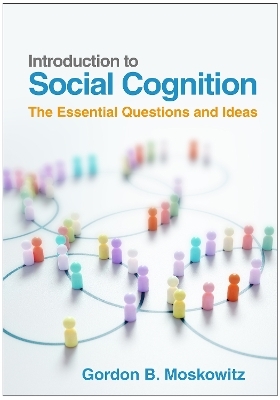
Introduction to Social Cognition
Guilford Press (Verlag)
978-1-4625-5454-6 (ISBN)
Why are first impressions so powerful? How do we “know” what others are like when we cannot read their minds? How can scientists measure biases that people do not want to admit--or do not know they have? This engaging text delves into social cognition by exploring major questions in the field through an everyday lens. Students are introduced to core concepts and processes pertaining to how people come to know themselves and understand the behavior of others. Classic and contemporary findings and experimental methods are explained. The text connects the research to pressing contemporary problems--the roots of political polarization, why even rational people fall prey to misinformation, and the best ways to reduce prejudice. Boxed definitions of key terms are included throughout.
Gordon B. Moskowitz, PhD, is Professor in the Department of Psychology at Lehigh University. He has served as Director of Lehigh’s Cognitive Science Program and Chair of the Department of Psychology. He served two terms on the executive committee of the Society of Experimental Social Psychology, has hosted the Society's conference twice, and annually co-organizes the preeminent social cognition conference, the Person Memory Interest Group. He has held editorial positions for Social and Personality Psychology Compass, as well as for the Journal of Experimental Social Psychology, and sits on the editorial board for Motivation Science and the Journal of Personality and Social Psychology. Dr. Moskowitz conducts research at the intersection of motivation, implicit bias, and social cognition. His work spans the topics of proactive control, impression formation, stereotyping, minority influence, bias reduction interventions, perspective taking, egalitarianism, self-regulation, impression updating, ambivalence, and backlash. His research program more recently has examined bias in the practice of medicine and the reduction of disparities in health and health care.
1. Thinking Is for Action (Purposeful), So We Make Meaning from Chaos
2. We Create Internal Mental Representations of External Reality
3. Self-Report Is Unreliable Because Cognition Is Often Automatic
4. We Can Know What People Think Even When They Don’t Know
5. First Impressions Are “Sticky” and Difficult to Update
6. First Impressions Can Be Implicit, Making Them Even More Persistent
7. We Follow Rules When Asking “Why?,” Acting Like Intuitive Scientists
8. Biases Are Common and Arise from Normal Cognitive Processes
9. Biases Are Common and Are Often Motivational in Nature
10. Beyond the Information Given: Responding Guided by Priming
11. Prejudice and Stereotyping
12. Cognitive Processing Is Flexible, and Processing Types Dissociable
13. The Updating of Impressions Is Promoted by Diagnostic Stimuli and One’s Goals
References
Author Index
Subject Index
| Erscheinungsdatum | 09.05.2024 |
|---|---|
| Verlagsort | New York |
| Sprache | englisch |
| Maße | 178 x 254 mm |
| Gewicht | 980 g |
| Themenwelt | Geisteswissenschaften ► Psychologie ► Allgemeine Psychologie |
| Geisteswissenschaften ► Psychologie ► Psychoanalyse / Tiefenpsychologie | |
| Geisteswissenschaften ► Psychologie ► Sozialpsychologie | |
| Medizin / Pharmazie ► Medizinische Fachgebiete ► Psychiatrie / Psychotherapie | |
| ISBN-10 | 1-4625-5454-7 / 1462554547 |
| ISBN-13 | 978-1-4625-5454-6 / 9781462554546 |
| Zustand | Neuware |
| Haben Sie eine Frage zum Produkt? |
aus dem Bereich


